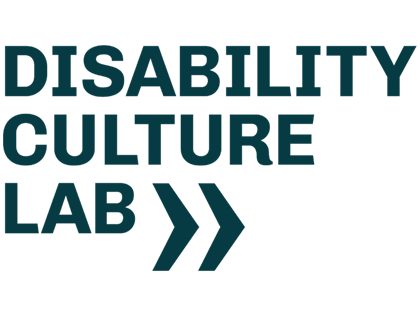
We are excited to welcome Disability Culture Lab as one of Proteus Fund’s newest fiscally sponsored initiatives. Launching earlier this month as the first-ever nonprofit disability media and narrative lab, the Disability Culture Lab will support strategic communications infrastructure by and for the disability community, rooted in disability justice. Their all-disabled team has deep roots across social justice movements, from reproductive justice to trans rights and Black and Indigenous liberation to workers movements and climate justice to housing.
Proteus Fund’s fiscal sponsorship of Disability Culture Lab is directly aligned with and representative of our deep commitment to disability justice. We share the lab’s beliefs that disability unites us across social movements and that the fight against ableism is key to every social justice fight. Proteus Fund’s vision of a fully representative and inclusive democracy cannot be achieved without the presence and power of the millions of individuals who are part of the disabled community.
We invite you to read more about Disability Culture Lab’s new and exciting work below and look forward to supporting their growth and impact!
Alexandra Rachelle Siclait
Director of Fiscal Sponsorship
Paul Di Donato
President & CEO
Today marks the launch of the Disability Culture Lab (DCL) — the first-ever nonprofit disability media and narrative lab, with a mission to shift the narrative on disability from fear and pity to solidarity and liberation and move the needle on ableism from indifference to action.
Through creative campaigning, strategic communications, fellowships, and a central resource hub, DCL aims to shift the narrative on disability from fear and pity to solidarity and liberation, and move the needle on ableism from indifference to action. Its unique strategic communications infrastructure — by and for the disability community — is rooted in disability justice.
“For the longest time strategic communications in the disability space was looked at as something indulgent. That is far from the case,” said Rebecca Cokley, U.S. Disability Rights Program Officer at the Ford Foundation – a founding funder. “Our community is strong and powerful, and how we communicate that is key. We have stories worth telling, inaccurate narratives that need correction, messaging that needs amplifying and tools that need refinement. And Ford is thrilled to support the Disability Culture Lab, in partnership with our friends at the MacArthur Foundation, in carrying out this mission.”
“The rights and lived experiences of people with disabilities have been ignored and discounted for years in large part because of the negative stereotypes and inaccurate stories spread and reified in the media and popular culture,” said Jen Humke, Senior Program Officer in the Journalism and Media Program at the MacArthur Foundation – a founding funder. “The Disability Culture Lab is well positioned to combat these negative and inaccurate perceptions by equipping the people and organizations that make up the disability community with the tools and power to change the narrative. We view the Disability Culture Lab as a 21st-century civil and human rights organization using the power of media, technology, and popular culture to make lasting change.”
The DCL is launching at a critical moment amid a rise in long Covid which has caused the largest disabling event since the Vietnam War. As of April 2024, an estimated 17 million adults are living with the disabling effects of long Covid. More than 1 in 4 Americans are disabled, and that number is growing. DCL is focused on building cross-disability solidarity and community — resourcing experts who’ve been disabled across movements — including reproductive justice, gun violence, Black liberation, gender justice, LGBTQIA+ rights, climate change, environmental justice, Indigenous justice, and beyond.
“We’re launching the Disability Culture Lab because we need a huge narrative shift on disability in the U.S. The face of disability, what we see in the news, doesn’t match the lived reality of disabled people,” said Meier Galblum Haigh (they/them), Founder and Executive Director of the Disability Culture Lab. “Disabled folks are Queer, immigrants, Black, Indigenous, and folks of color. We are disabled by domestic violence, cops, and brutal trips across borders. Our stories are joyful and messy, and we deserve to thrive as we are, now. We need communications infrastructure, by us and for us, that is in solidarity with other movements for justice, because our liberation is deeply intertwined.”
“As a Black disabled woman, I’m intimately familiar with the ways ableism seeks to diminish the lives and contributions of our community. I’m thrilled to be co-chairing the DCL Board because our movement desperately needs work that will shift the narrative on disability and position us to thrive now — not in some far off future when the world decides to care about us,” says Kenrya Rankin, Co-Chair of the Disability Culture Lab Advisory Board, and Accessibility Lead, Disability ERG Co-Lead, and Research Editor at Mozilla Foundation.
“I’ve worked in newsrooms for 18 years, and one thing that has become apparent is the lack of resources for accurate, compassionate and investigative reporting on disabled people and our stories. I’m excited to co-chair the DCL Board because we are going to fill an essential gap — providing journalists with sources that challenge ableist institutions, including the status quo in newsrooms. By mapping the incredibly talented disability community experts nationwide, we will provide sources when and where journalists need them,” says Cara Reedy, Co-Chair of the Disability Culture Lab Advisory Board, and Executive Director of the Disabled Journalists Association.